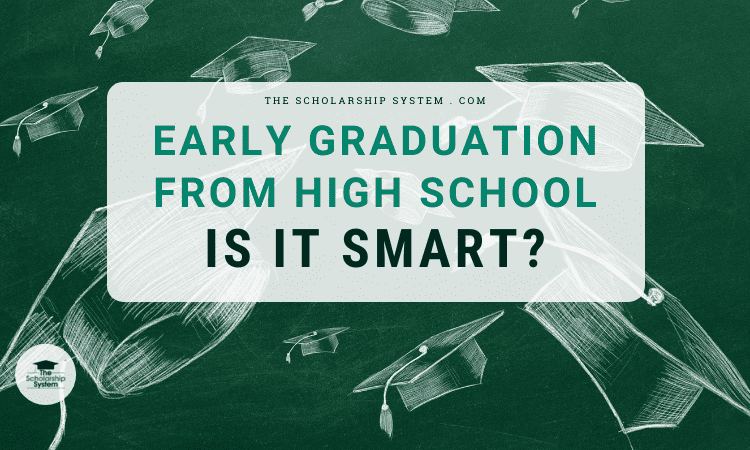Updated on May 31st, 2024
For many students, the idea of graduating from high school early is incredibly appealing on paper. However, many also wonder, “Is early graduation from high school actually a good idea?”
Ultimately, there are pros and cons to finishing a high school education early. As a result, students need to consider both perspectives before making a choice.
Did you know that there are scholarships for early high school graduates? It’s true. If you and your student want to learn about early graduation from high school scholarships, sign up for our free college scholarship webinar! Take a quick trip over to http://thescholarshipsystem.com/freewebinar to reserve a spot today.
If your student is debating whether graduating high school early is the best move for them, here’s what you and your student need to consider.
Contents
- 1 WHAT DOES GRADUATING FROM HIGH SCHOOL EARLY MEAN?
- 2 IS IT POSSIBLE TO GRADUATE HIGH SCHOOL EARLY?
- 3 WHY WOULD YOU WANT TO GRADUATE EARLY?
- 4 HOW TO GRADUATE FROM HIGH SCHOOL EARLY
- 5 DOES GRADUATING HIGH SCHOOL EARLY AFFECT COLLEGE?
- 6 PROS AND CONS OF EARLY GRADUATION FROM HIGH SCHOOL
- 7 FAQs
WHAT DOES GRADUATING FROM HIGH SCHOOL EARLY MEAN?
In most cases, graduating from high school early means completing the required coursework and meeting graduation criteria before the traditional timeline. This option allows students to finish their high school education ahead of schedule, which means in less than four years.
Precisely how early a student graduates may vary. Some may complete their senior year one semester early, while other students may shave off an entire year or more.
However, getting a GED can also fall into this category. Generally, this is true if the student passes the test prior to the time they would have finished all of their high school graduation requirements.
IS IT POSSIBLE TO GRADUATE HIGH SCHOOL EARLY?
Yes, it is technically possible to graduate high school early. However, it isn’t always under a student’s control.
If your student hopes to wrap up their high school education in less than four years, they’ll need to meet the conditions outlined by the school district. Usually, that means having enough of specific kinds of credits. However, other factors may also play in, such as maintaining a minimum GPA.
For students considering getting a GED instead of a traditional high school diploma, there are other requirements to navigate. Students might need to be of a certain age or not unenrolled in high school classes, for example.
WHY WOULD YOU WANT TO GRADUATE EARLY?
Deciding whether your student should graduate from high school early isn’t easy, but there can be good reasons for going this route. Here are just a few of the reasons why graduating early may benefit your student.
ACCELERATED ACADEMIC AND CAREER OPPORTUNITIES
Graduating early can give your student a head start on their academic and career paths. This faster launch can be particularly beneficial for students who are clear about their career goals and are eager to dive into specialized fields. By entering college or the workforce sooner, they can gain valuable experience and build their professional network, giving them a functional head start.
FINANCIAL SAVINGS AND SCHOLARSHIP OPPORTUNITIES
Completing high school early may lead to financial savings. By reducing the time spent in high school, your student can potentially save. They’re bypassing an entire year of schooling, which means less total spent on supplies, at a minimum. For private high school students with tuition costs, the reduction in expenses is even more substantial.
PERSONAL GROWTH AND DEVELOPMENT
For some students, early graduation provides the chance to pursue personal interests and development. Whether it’s traveling, volunteering, or engaging in internships, this extra time can be invaluable for personal growth. It allows your student to explore passions, gain life experiences, and develop a well-rounded perspective that can be beneficial in both their academic and professional futures.
HOW TO GRADUATE FROM HIGH SCHOOL EARLY
Early graduation from high school isn’t something a student can do on a whim. Instead, it usually requires a bit of planning, ensuring students can meet the requirements before they would traditionally finish high school.
Fortunately, the path is reasonably straightforward. Here’s how students can make it happen.
SPEAK WITH A SCHOOL COUNSELOR
Generally speaking, students interested in graduating high school early need to talk with their guidance counselor to create a plan close to the beginning of their high school career. By speaking with a school counselor, students can learn about the graduation requirements and class scheduling options available, making it easier to find the proper path.
Since students who want to start college early will need to squeeze in more classes, they’ll need as much time available to do so as possible. That’s why setting up that meeting as soon as possible is essential.
PLAN OUT THE HEAVIER COURSE LOAD
Typically, your student will have to take a heavy course load to make graduating from high school early possible. That way, they ensure they handle all of the graduation requirements in less than four years.
In some cases, figuring out how to finish high school early requires little more than substituting core classes for certain kinds of electives or free periods. In others, it could mean taking extra courses or online classes or attending summer school. Ultimately, the school district will determine whether one or multiple options are viable for your student.
REEVALUATE THE PLAN REGULARLY
As your student begins taking classes at an accelerated rate, it’s critical to review the overall plan regularly. The courses high schools offer and the time of day they are available can vary from year to year, so adjustments to the schedule are potentially necessary.
Additionally, while your student may initially like the idea of graduating early, they could also change their mind. They might decide the extra strain is more than they want to bear, and that’s okay. After all, they can always switch back to a more traditional timeline, so check in with them regularly to see if they’re still motivated to graduate early or if they’d prefer to pull back.
CONSIDER THE GED AS AN ALTERNATIVE
Instead of handling all of the traditional graduation requirements early, your student could explore getting their GED. It allows them to exit high school with a similar credential to a conventional diploma without having to personally complete all of the typical courses.
However, this might not be ideal in all situations. It does mean that your student isn’t actually taking the typically required high school classes, so they could end up with knowledge gaps that may impact them in college. Additionally, it may alter their college prospects and experience.
DOES GRADUATING HIGH SCHOOL EARLY AFFECT COLLEGE?
Graduating high school early can affect college, but usually not in the way that students expect. It’s easy to assume that wrapping up high school quickly would boost their college application. In reality, colleges don’t typically view early graduates any differently. In the end, their grades on the transcript will look the same as those of someone who took four years to earn their diploma, aside from their being fewer semesters on the list.
However, that doesn’t mean there isn’t any impact. Instead, it’s that the potential effects don’t necessarily work in your student’s favor.
For example, if your student finishes high school early, they may have fewer opportunities to earn college credits through AP or similar programs. As a result, they may end up paying more for their education.
Additionally, certain kinds of awards – like athletic scholarships – may be less available. That drives the price of their education up.
If your student gets overwhelmed trying to fit in extra classes, their performance may suffer. As a result, they could end up with a lower GPA, potentially making it harder to get into their top-choice school.
Whether those points matter ultimately depends on where your student wants to go after high school. For less competitive colleges or trade schools, it may be irrelevant. However, if they’re aiming at a top-tier university, it could make a difference.
PROS AND CONS OF EARLY GRADUATION FROM HIGH SCHOOL
If you or your student are wondering, “Is it good to graduate high school early?” the answer is, “It depends.” There are some benefits of graduating high school early, as well as drawbacks.
Whether it’s the right move for your student will depend on their broader goals. However, by looking at graduating early from high school pros and cons, it’s easier to determine whether it’s the right path for them.
PROS OF GRADUATING FROM HIGH SCHOOL EARLY
HEAD TO COLLEGE (OR START A CAREER) FASTER
The most significant benefit of graduating from high school early is getting to start college (or a career) faster. If your student is academically inclined or doesn’t mesh well with the rest of the high school experience, graduating with high school credits early lets them move on quickly.
In turn, if heading to college is part of their plan, they may graduate from that more quickly, too. In any case, they’ll be starting the next phase of their life faster.
Plus, graduating in their junior year early may also allow your student to avoid senioritis. However, this isn’t universally true.
TIME FOR A GAP YEAR OR SEMESTER
Another one of the benefits of graduating early is that it could create room for a gap year or semester. With that, your student may be able to find ways to help pay for college. They could also volunteer to gain experience (or qualify for scholarships) or simply take a step back from academic life to refocus and recenter.
ACCESS TO EARLY GRADUATE SCHOLARSHIPS
There are scholarships that specifically target early high school graduates. By wrapping up high school ahead of schedule, your student may qualify for awards that have far less competition than the average scholarship. Overall, graduating from high school early is rare, so your student may have an easier time landing these kinds of awards.
CONS OF EARLY GRADUATION FROM HIGH SCHOOL
AGE DIFFERENCES CAN MATTER
Your student’s age at graduation is a potential drawback to consider. While students who graduate a semester early may be 18 when they leave high school or begin their next phase, many students are of legal adult age if they graduate early by a year or more. This can be a hindrance, depending on their broader plan.
For example, work restrictions can apply to individuals under 18. Similarly, while a minor may be able to dorm at a college, getting their own apartment might not be possible. Finally, students under 18 may have trouble getting non-federal student loans or other financing because they’re classified as minors.
Being under 18 could also mean they aren’t able to participate in certain activities or go to the same places their classmates or colleagues can, creating a sense of separation.
Younger graduates may also lack some emotional or mental maturity, comparatively. As a result, they may struggle to fit in with those around them.
HIGHER ODDS OF ACADEMIC BURNOUT
Since graduating early usually means taking on a heavier course load, your student is pushing themselves academically. As a result, they may be more likely to experience academic burnout.
Essentially, the process of graduating early can be pretty challenging and can leave them stressed and overwhelmed. As a result, their performance may suffer, and they could struggle with mental health. Additionally, the idea of moving on to college could become less appealing since they’re academically exhausted.
SEPARATION FROM FRIENDS
Unless your student is part of a friend group that all intend to graduate early, finishing high school ahead of schedule could lead to some social challenges. Your student’s priorities will be in a different place. Additionally, they’ll effectively leave friends behind when they start college earlier as they wrap up their classes and launch the next phase of their lives.
Early high school graduates may also miss out on certain milestones. For example, senior proms aren’t something early graduates of high schools usually attend. Additionally, they won’t be attending a graduation ceremony with their original class.
GED HOLDERS MAY HAVE A HARDER TIME GETTING INTO COMPETITIVE COLLEGES
If your student opts for a GED instead of graduating from high school early in the traditional fashion, it may or may not limit their college prospects initially. If your student is interested in wrapping up high school to head to a local community college, trade school, or less competitive university, that may work. But if they set their sights on a highly competitive college, a GED instead of a high school diploma could make it harder to get accepted.
If your student gets a GED – especially earlier in their high school career, such as their freshman year or sophomore year – they might not have access to a traditional high school transcript. As a result, they’ll have a more difficult time showcasing their past academic performance to most colleges. Additionally, they may be ineligible for athletic scholarships or other kinds of awards, depending on how the university determines who qualifies.
FAQs
WHAT IS THE EARLIEST SOMEONE HAS GRADUATED HIGH SCHOOL?
The youngest high school graduate, Michael Kearney, completed high school in one year and earned a diploma at age 6 in 1990. More recently, David Balogun completed his K-12 level education at age 9 in 2023. However, these kinds of early graduates are exceptionally rare.
IS GRADUATING AT 16 GOOD?
Graduating high school at 16 can be an excellent opportunity for motivated and academically advanced students. It offers a head start on college or career paths, potentially saving on educational costs and allowing earlier entry into the workforce. However, it’s essential to consider your student’s maturity and readiness for the challenges of higher education or professional environments. Support from family, counselors, and educators is crucial in ensuring a smooth transition. Ultimately, the decision should align with your student’s personal goals, learning style, and long-term aspirations.
Did you know that there are scholarships for early high school graduates? It’s true. If you and your student want to learn about early graduation from high school scholarships, sign up for our free college scholarship webinar! Take a quick trip over to http://thescholarshipsystem.com/freewebinar to reserve a spot today.









Leave a Reply